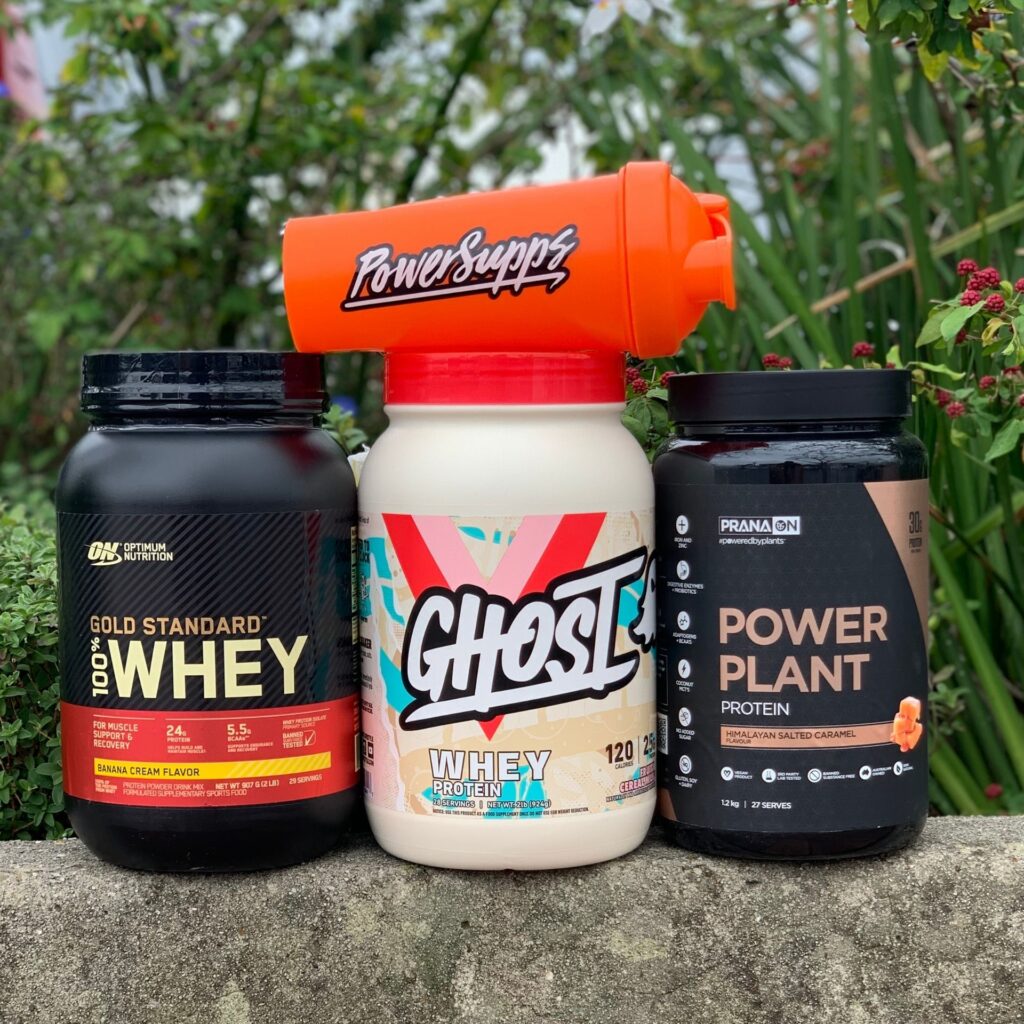Supplements
Do I mix protein powder with water or milk?
Protein powder is undeniably the most popular supplement used today. Protein, as many know is an essential macronutrient required for building muscle and repairing tissue. It is also used in the production of enzymes and hormones within the body for various physiological and biochemical processes. Chances are that you already have your favourite go-to protein powder. We also hope you know it’s benefits and how it works best for you. One of the most commonly asked questions is “Do I mix protein powder with water or milk? So is there a difference you may ask? Well this is exactly what we are here to answer in it his guide.
Different Types of Protein Powders
There are now numerous protein powders types on the market that line the shelves in stores. Each have their own unique advantages depending on the preferences and goals of the individual and the product itself.
Common types of protein –
- Whey Protein – Whey Protein Isolate, Whey Protein Concentrate, Whey Protein Hydrolysate
- Casein Protein
- Collagen Protein
- Plant-Based Protein and blends
- Egg Protein
Regardless of whether the protein is animal or plant-based, protein powders come in three forms –
- WPC or Protein concentrates: Produced by extracting protein from whole food using heat and acid or enzymes. These typically supply 60–80% protein, with the remaining 20–40% composed of fat and carbs
- WPI or Protein isolates: An additional filtering process removes more fat and carbs, further concentrating the protein. Protein isolate powders contain about 90–95% protein
- HWPI or Protein hydrolysates: Produced by further heating with acid or enzymes — which breaks the bonds between amino acids — hydrolysates are absorbed more quickly by your body and muscles
Most Popular Proteins
Whey is known as a complete protein which means that it contains all nine essential amino acids. Our bodies require these specific aminos but are unable to produce naturally. Whey aids in both muscle growth and repair and also the very important role of muscle recovery.
Casein protein is also lactose-based like whey and most seem to consume either as a dessert or before bed. There are now many dessert-style casein products flooding the market that when made with milk can create a dessert or treat that rivals the real deal.
Whey Isolate contains minimal, to no lactose. Whey Protein Isolate appears to work well for most people who don’t seem to have any lactose sensitivities.
Collagen Protein is incredibly popular at present due to its unique anti-aging benefits. It has a much different consistency to whey making it easier to consume for some individuals. It is also a great alternative for those who have a dairy sensitivity or who don’t enjoy plant-based proteins.
If you are wanting something that is completely free from any dairy or animal products then plant-based protein is the way to go. Pea protein, hemp protein, rice protein or plant-based blends are a great option. These types still provide a rich and high quality source of protein.
Milk-Based Protein Shakes
If you don’t have an intolerance to lactose or any digestive sensitivities then mixing your protein powder of choice with cows milk is an incredibly delicious option. Mixing your favourite powder with milk adds additional calories, carbohydrates, fats and protein to the shake. It will also create a thicker consistency that some may enjoy drinking over a shake that is water based. These extra calories and carbohydrates may be an advantage if you are looking to put on some additional size weight.
If you are consuming your shake prior to training the additional carbohydrates and fat of mixing your protein with milk will be utilised by the body as fuel for your workout. Be carfeul not to consume to close to training as this combination might casue an upset stomach.
One thing to also note is that adding milk to your protein shake may slow you down the absorption of your protein powder. If recovery and lean muscle growth is your primary concern then mixing your shake with milk may not be the best option as the casein protein contained in milk may slow down rate of absorption.
Water-Based Protein Shakes
Mixing your protein powder with water is the first option of most individuals. Mixing with water allows for the ingredients to be absorbed and digested much faster. This mix also creates a much thinner consistency which for many makes it much easier when consuming.
All powders these days mix instantly with water and there will be no clumping of the product whatsoever. 15 years ago when protein first came out there was this issue. However, the newer forms of protein are much more advanced and this will not be an issue.
Water is also a convenient and inexpensive option especially for when you are on the go. Shakes that are mixed with cow’s milk or plant-based milks will generally require refrigeration. Room temperature water is more than fine for mixing your favourite shake and you needn’t have to be concerned that it will turn into something that doesn’t taste so great.
Plant-based Milk Protein Shakes
For some, plant-based milk options are of preference. Common plant based milk choices are –
- Almond milk
- Soy Milk
- Various Nut Milks
- Oat milk
- Pea Protein Milk
If you prefer a creamier texture and don’t mind the additional calories, then mixing your protein powder with a plant-milk is a delicious option and an alternative if you are unable to consume or don’t like the taste of cow’s milk.
Most plant-based milks ten d to be sweetened and are higher in calories. For those who may be more calorie conscious and still want to have the texture that milk provides, unsweetened almond milk is a great go-to in this instance. and is relatively inexpensive.
Who Should Drink Protein Shakes?
Basically anyone from professional athletes, to avid gym-goers to bodybuilders are all consumers of protein powders and all in all we all require protein for normal physiological and biochemical processes.
High-quality protein sources first and foremost should be sourced from whole foods, however for some, consuming enough protein on a daily basis can be a difficult task. This is where protein supplementation can be highly beneficial.
Pre and post training is also where protein supplementation is highly advantageous. During physical activity our muscles are drained from their energy stores. Drinking a rapidly absorbed and digested high quality protein shake will mean that your muscles are well on their way to being fuelled again and given a head start in the recovery process.
Milk vs. Water Protein Shakes for Increasing Lean Muscle Mass and for Weight Loss
When it comes to wanting to build muscle mass your whey protein shake can be supercharged by mixing a scoop with your favourite milk of choice. Whey protein in particular is renowned for promoting muscle protein synthesis, which is the primary focus when wanting to put on some size.
In this instance, and as we have noted earlier, the additional calories from whole milk, semi-skimmed milk or plant based milk will only aid in the process. Although the absorption of the protein can be slightly hindered by mixing with milk, overall the additional calories and macronutrients that you shake will provide will outweigh that factor.
When it comes to weight loss, mixing your protein powder with water is often the most ideal choice. Protein water yields less calories overall, does not hinder the absorption and digestion rate of the product itself and still has a satiety effect.
If your protein intake is inadequate and you are mindful of your calories, then mixing with water will add a high quality protein hit minus additional unwanted calories.
Calories in Protein Shake Bases
Any milk that you use will have more calories than water. Water adds no calories whatsoever. If we were to take a closer look at the additional calories in cow’s milk in particular, in general –
- One cup of full-fat cow’s milk – Over 150 calories and 9 grams of fat
- Semi-skimmed milk with 2% fat content – Approximately 125 calories and 5 grams of fat
- One cup of skim milk – Under 100 calories and under 1g of fat
Most plant-based milks are relatively low in calories unless they are sweetened. Coconut milk is somewhat of an exception as it is very high in calories and fats. This may be great for when calories are not of concern or may be following a higher fat diet, but if you are looking at weight loss then unsweetened almond milk is a better option.
Is taste an important factor for you?
Whey is still the most popular protein powder consumed by a broad range of individuals. Water is a low density liquid, especially in comparison to other milks. Whey protein, and most other proteins for that matter do mix more easily or instantize with water and this mixture does not compromise the absorption rate of the product itself.
If taste matters to you over anything, then mixing your protein powder of choice with milk will provide you with a much better taste and texture then mixing your protein with water.
Health Benefits of Milk Proteins
Additional calories aside, milk proteins do provide you with added health benefits that can certainly aid your health and physique goals.
Some of the health benefits of adding milk to your protein powder include –
- Milk contains calcium for strong bones
- Milk contains healthy fats
- Cow’s milk provides added nutrients that protein power mixed with water alone does not provide. Nutrients such as potassium, phosphorus, vitamin A, vitamin D, vitamin B12, riboflavin, phosphorus are all found in milk and are important for the body’s vast number of processes
- Cow’s milk is also a high quality source of essential amino acids. Although whey protein contains all nine essential amino acids, the addition of cow’s milk will only enhance the health benefits even further
The Pro’s of Mixing Protein with Water or with Milk
Pro’s of mixing protein with water
- Generally mixes very easily with both cold water and room temperature water
- Readily available and inexpensive
- Does not hinder the digestion and absorption of the product
- More suitable for weight loss due to less calories being consumed
- Suitable for those with milk intolerance or sensitivities to dairy
Pro’s of mixing protein with milk
- Requires refrigeration and preparation time
- More expensive
- Adds additional nutrients
- Adds additional calories, protein, fats and carbohydrates
- Suitable to be consumed at night or post training
- More suitable for gaining muscle mass
- Taste is smooth and creamy and a thicker texture
So what do we think?
So the answer to the big question, should you have your protein shake with milk or water? There are benefits and differences between mixing your protein with milk or water. Taste and consistency aside, there are some serious differences between taking your protein with milk and water
Mixing with water ensures that digestion and absorption are not compromised and there are no additional calories added from the additional fats and carbohydrates in milks.
Mixing with milk can add additional nutrients to your shake which may be lacking in protein powders alone. Water appears to be the choice for those who may be watching their weight and caloric intake.
If taste is your be all end all then mixing your protein powder with milk, whether it be cows milk or a plant based alternative will create an incredibly delicious and creamy protein shake that will have you wanting more.

